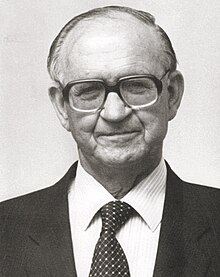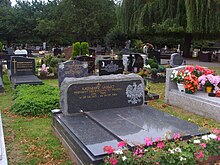Kazimierz Sabbath
Kazimierz Aleksander Sabbat (born February 27, 1913 in Bieliny Kapitulne , Kielce County , Poland ; † July 19, 1989 in London ) was a Polish lawyer , businessman and politician .
education
Son of the church cantor in his hometown, he passed the Abitur exam in Mielec and then studied law at the University of Warsaw , where he received his master's degree in June 1939. During his studies at grammar school and university, he was already active in the Polish scout movement and created a central organization for scouts at Polish universities.
After the Polish defeat in September 1939, he fled to Hungary in October , where he was in command of a camp for Polish boy scouts. He then moved to France via Yugoslavia and Italy , where he received a position as an officer candidate in the Polish Navy . After the transfer of the Polish troops to Great Britain , he became a scout officer in the General Staff of the Polish Armed Forces in London.
activity
After the war, Sabbat stayed in London and in 1948 founded a company that produced sleeping bags and blankets and became quite successful. At the same time he was active in the scout movement of the exiled Poles as a delegate for foreign countries and in various political organizations: Among other things, he succeeded in 1972 in reconciling the quarreling circles surrounding the Council of Three and the exiled president after Stanisław Ostrowski took over the presidency . In August 1976 he became Prime Minister in exile and immediately created an aid organization for persecuted workers in Poland, which later supported the democratic opposition in the country. As Prime Minister he visited Polish circles in exile in Europe and overseas.
On April 8, 1986 after the resignation of the exile president Edward Raczyński , he took over his office as exile president and administered it in difficult times during the final battle of Solidarność with the dying communist regime. He did not live to see the emergence of the 3rd Polish Republic. The funeral mass for him on July 19, 1989 in the St. John's Cathedral in Warsaw turned into one of the last major demonstrations against the regime.
| personal data | |
|---|---|
| SURNAME | Sabbath, Kazimierz |
| ALTERNATIVE NAMES | Sabbat, Kazimierz Aleksander (full name) |
| BRIEF DESCRIPTION | Polish lawyer, entrepreneur and politician |
| DATE OF BIRTH | February 27, 1913 |
| PLACE OF BIRTH | Bieliny Kapitulne , Kielce County , Poland |
| DATE OF DEATH | July 19, 1989 |
| Place of death | London |


